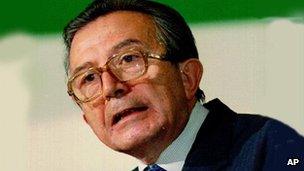Giulio Andreotti: Ex-Italian prime minister dies
- Published

Giulio Andreotti, one of the most prominent political figures of post-war Italy, has died aged 94.
Mr Andreotti was Italian prime minister seven times between 1972 and 1992. He led the Christian Democrat party, which dominated Italian politics for decades.
He was dogged in later years by allegations of corruption and Mafia links.
He died at home in Rome. He was reported to have suffered heart and respiratory problems in recent years.
Rome's Mayor, Gianni Alemanno, called Mr Andreotti "the most representative politician" in recent Italian history.
But others saw him as an arch political manipulator.
Another former Prime Minister, Massimo D'Alema, said he was "a highly disputed figure... for his conception of power".
Mr Andreotti entered the Italian parliament in 1946 and remained there for more than 60 years, before seeing out his days as a senator-for-life.
He had a reputation for cunning. He managed to find and meet the Pope as an eight-year-old after sneaking away from a Vatican tour group.
He later became one of the founding fathers of the post-war Italian republic, says the BBC's David Willey in Rome.
He was a junior minister at the age of 28, and went on to serve as either prime minister or a senior minister in the many frequently changing Christian Democratic coalitions that held power almost continuously between 1946 and 1992.
The party then lost power and collapsed.
'Kiss of honour'
He was strongly anti-communist, pro-American and supportive of Nato.
He was known as a pro-European who committed Italy to European integration and helped forge the way forward to a single currency.
He was one of the most prominent figures of the "years of lead" during the 1970s and 1980s, when hundreds of people were killed in political violence.
And he himself faced a string of allegations of links with corrupt financiers and top criminals.
He was accused by a supergrass of sharing a "kiss of honour" with the Mafia's "boss of bosses", Toto Riina, at a secret meeting in 1987.
And he was tried for allegedly ordering the murder of a journalist who had threatened to publish details of his alleged Mafia involvement.
His acquittal was subsequently overturned by an appeals court, which sentenced him to 24 years in prison - before that ruling, too, was overturned.
However, in 2004, Italy's top appeals court did uphold a verdict that he had "consciously and deliberately cultivated a stable relationship" with Mafia bosses.
But he was not formally convicted because the offence had lapsed under Italy's statute of limitations.
And he remained a senator and an influential political figure until his final years, not least because of his close ties with the Vatican.
He died at his apartment in Rome, just a stone's throw from Vatican City.
- Published6 May 2013
- Published9 December 2022